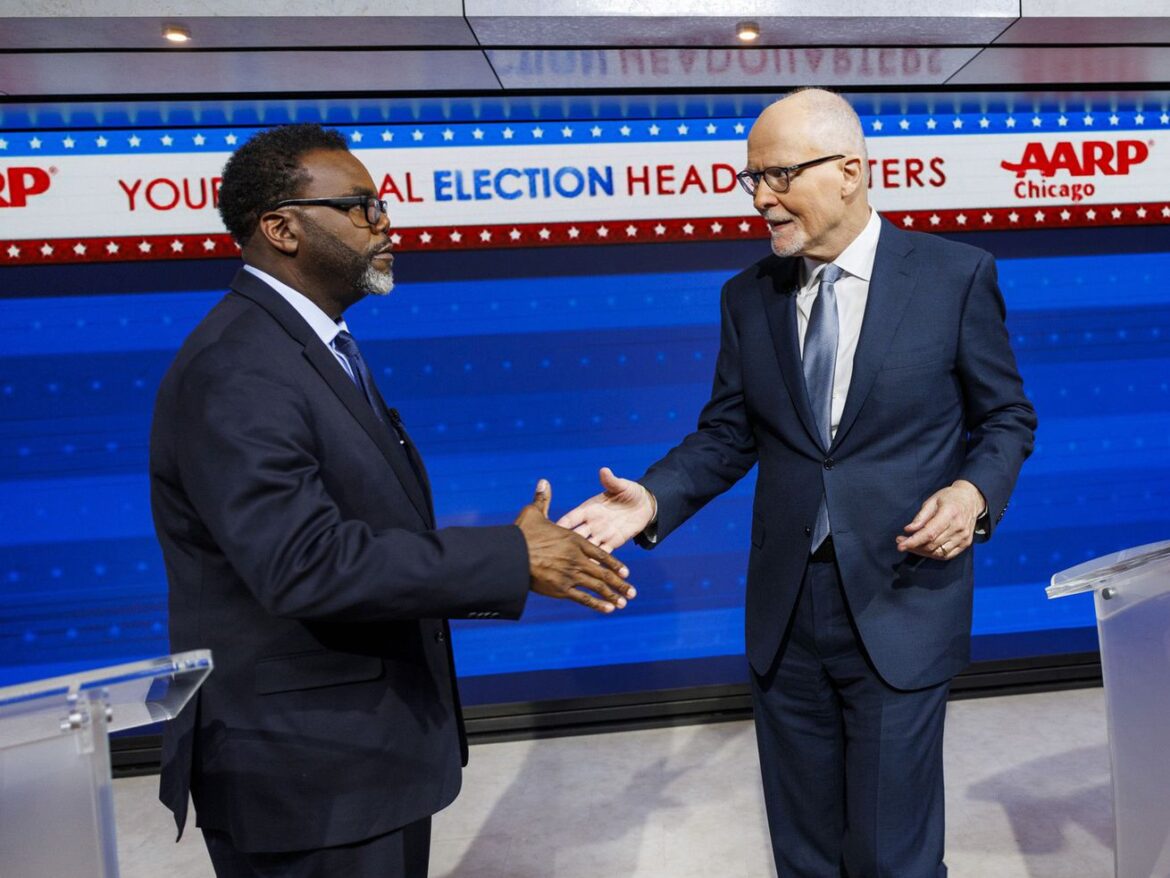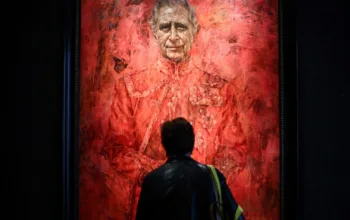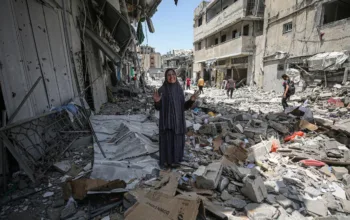Despite concerns about crime in Chicago, progressive Brandon Johnson beat moderate Paul Vallas.
In a surprise victory for progressive organizing and the future of police reform efforts, Chicago voters elected underdog former education organizer Brandon Johnson as mayor, beating back moderate Democrat Paul Vallas, according to the Associated Press. Johnson beat Vallas, a centrist former budget and public schools chief, despite Vallas’s tough-on-crime messaging, which resonated with moderates and white voters.
The progressive victory happened a bit over a month since voters soundly rejected their incumbent mayor, Lori Lightfoot, in the first round of voting in the mayoral election, largely over dissatisfaction with her promises for reform of schools and city policing. With Johnson’s victory, the third-largest city in the country has made an ideological pronouncement about a core tension within the Democratic Party nationally about how to respond to concerns about crime.
Vallas had been the frontrunner for the last few months against Johnson, who got his political start as an organizer with the city’s teachers union. The election pitted two powerful Chicago constituencies against each other: Vallas was backed by the city’s vocal and controversial police union and Johnson was backed by the teacher’s union.
Chicago seems to have defied a recent trend in Democratic big-city politics in which tough-on-crime rhetoric, particularly when pitched toward moderate and conservative voters of color, could tip elections. Crime and public safety have been the top concerns for voters throughout the Chicago mayoral contest, mirroring concerns in local races in Los Angeles, San Francisco, and New York City that cities have seen a rise in crime since the pandemic began, though violent crime rates have since begun to fall in many of these areas.
Crime worries aren’t unique to Chicago, of course, but the feeling of a more violent city has roots in fact: In Chicago, homicides and shootings have continued to trend down this year after drastic rises in 2020 and 2021, while rates of property crime remain high, according to Chicago Police Department statistics. And regardless of the data, nearly two-thirds of voters have reported feeling unsafe in the city, something that helped doom incumbent Mayor Lori Lightfoot’s efforts at reelection.
There was also a big ideological divide in the race that mirrors national struggles within the Democratic Party across the country. The party establishment, including a current US senator and a former governor and statewide leaders, rallied around Vallas, the former Chicago schools chief, and he was boosted by business leaders and the largest city police union. Progressives coalesced behind Johnson, who had the support of national and local activist organizations, organized labor, and, more specifically, the powerful Chicago Teachers Union.
This split emphasized the longtime struggle progressive activists, organizations, and candidates have faced to win competitive elections against moderate or conservative establishment politicians. “This is the fundamental fault line within the Democratic Party we’re seeing being played out,” Joseph Geevarghese, the executive director of the Bernie Sanders-aligned progressive network Our Revolution (which backed Johnson), told Vox.
Vallas and Johnson represent different visions for Democratic politics
Vallas and Johnson are nearly perfect contrasts of Democratic candidates and their bases of support. Though Vallas was long expected to emerge from the first round of voting near the top of the pack, Johnson did not have a lot of name recognition throughout the first wave of campaigning. Johnson’s second-place finish was the culmination of a late burst of support that coincided with the slow slide in the polls of US Rep. Jesus “Chuy” Garcia, the onetime frontrunner, and the gradual consolidation of progressive support around Johnson.
Within the city, various centers of power had been jockeying over influencing and reaching voters. The powerful Chicago Teachers Union (CTU) had been working hard to convince voters of Vallas’s controversial past as the former CEO of the Chicago public school system and to boost Johnson’s credentials as a solid progressive Democrat. Though still an underdog, Johnson gained the backing of both traditional bastions of liberal support, like the CTU and an array of SEIU-affiliated unions, and national progressive groups, like Our Revolution and the Working Families Party, which have invested time in rallying supporters, door-knocking, and informing voters about their options.
Boosting Vallas had been the Fraternal Order of Police (FOP), the union that represents the majority of Chicago’s police officers. Often called controversial (for example, it invited Florida Gov. Ron DeSantis to speak to officers in February), the union also wields significant influence in Chicago politics, and lent legitimacy to Vallas’s broader campaign focus of centering public safety. Vallas tried hard to contrast his vision of policing with Johnson’s, by promising to fill vacancies in the police force, deploying police to the city’s public transportation network, and increasing funding for the police department. That last plank of his message was also meant to contrast with Johnson’s previous support for calls to “defund the police” in the wake of the police killing of George Floyd in 2020. Johnson now opposes cuts to police budgets, and has emphasized his goal of hiring 200 new detectives to focus on solving and deterring crime.
Both the FOP and CTU frequently clashed with Lightfoot — the CTU went on strike while negotiating a new contract with the city, while the FOP resisted coronavirus vaccine mandates and criticized Lightfoot’s police reform attempts and crime-prevention policies. Vallas had also been supported by some of the city’s biggest businesses and corporate leaders, who funded the bulk of his financial war chest.
Vallas raised more than $19 million, about $8 million more than Johnson has raised, and outspent Johnson by a nearly two-to-one margin on television ads. Johnson’s campaign had said in recent weeks that it was planning to go on the offensive with heavier spending in the closing days of the race — though Vallas has clearly had an advantage throughout the cycle.
The Chicago voters who could swing the election
Out of all the candidates that ran in the first round, Vallas and Johnson won the majority of their support from Chicago’s white voters. A WBEZ precinct-level analysis of the city’s first round voting results reached the conclusion that voters in Vallas- or Johnson-voting precincts were more likely to live in the city’s safest neighborhoods, and more likely to be “white, college-educated, employed, living in households earning more than $100,000 a year and sending their children to private schools.”
Both the Vallas and Johnson campaigns recognized this, and spent time and resources trying to reach the Black and Latino voters who voted for Garcia, Lightfoot (who won most Black precincts in the city), and businessman Willie Wilson. Garcia ended up endorsing Johnson and Wilson endorsed Vallas, but Lightfoot didn’t wade in since her loss. Voters in majority-Black neighborhoods may have been the deciding factor in the election, and both Johnson and Vallas spent the closing weeks of the campaign zeroing in on those areas of the city, where turnout rates have historically lagged behind majority-white precincts.
The most recent polling, released last week from Northwestern/BSP Research, found that Johnson had a 27 percentage point lead among Black registered voters over Vallas, while Vallas led among Latino voters by 11 points. Final figures for how different demographic groups voted have not been finalized yet.
White voters were more evenly split, but a sizable chunk of all voters, about 11 percent, remained undecided in the closing days of the race. Those ethnic and racial dynamics are also representative of a city that still remains highly stratified by race, wealth, and crime rates. Vallas’s more hardline message on crime seemed to resonate with white voters and could have peeled away support from Johnson among Black and Latino voters. But the neighborhoods most affected by crime did not back Vallas in the first round. Tuesday’s results have likely confirmed that despite inroads, Vallas’ crime-focused message did not work to persuade enough of those voters.
“An upset for me really comes down to proving the point that organizing people-powered mobilizing can beat back the flood of corporate money that comes in,” Geevarghese, of Our Revolution, said. “Brandon’s win shows that a broader message about safety can resonate, and not just a hiring-more-cops, lock-up-more-people message.”



